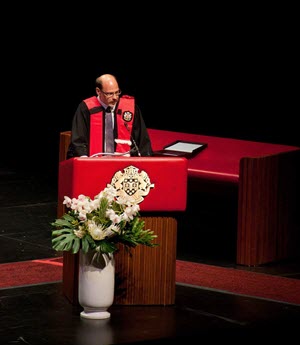
Photo: Correctional Investigator Receives Honorary Doctorate.
Photo of Mr. Howard Sapers, Correctional Investigator.
President Rock, platform guests, class of 2016 -
Thank you and hello everyone. It’s a great honour to be here with you today on this very special day.
And what a privilege to be at this convocation and be recognized along with all of you who have worked so hard, made sacrifices and earned your degrees.
Bravo! And congratulations to all the graduates today.
Achievement, as you all know, is a team sport. For the last dozen years I have been privileged to head the Office of the Correctional Investigator.
My Office is staffed with talented, professional, dedicated public servants. Their efforts to protect human and legal rights are a source of pride for me and a service to Canadians. I share today’s recognition with each of them.
I want to take a moment to thank my family as well. As I said, no one succeeds as an individual. We all rely upon others, and none so much as family.
I would like to especially thank my wife Linda, my daughter Haley, and my sons Jeremy, Quinn and Vaughn.
Today is Father’s Day. And along with my wife, my daughter and two of my sons, my father in law is attending this ceremony. Happy father’s day to him and all the other dads in the audience.
My family has not only accepted my career choices, but has put up with relocations, living under a spotlight, missed family events and more. I thank them. And this is a good time for each of you to think about and thank all those who have supported you as you have pursued your goal of a post-secondary education.
I was recently reading an article about Dr. Sybrand van der Zwagg, the Scientific Director of the Delft Centre in the Netherlands. He had been asked to give his top 5 tips for young researchers thinking about their next move. This is what he said:
- There is no good or bad strategy for a career, but it is important it fits your personal strengths.
- Be honest about what work conditions make you happy and accept that your route to happiness may be via many detours.
- When considering career options, take a close look at the prospective workplace, your potential future boss and colleagues. Are they happy? Do their values and ethics fit with yours?
- Remember, it is important to invest time and effort into the career and aspirations of your life partner. Your happiness and success is linked to theirs.
- Don’t be distracted by false choices: Public sector vs. private, industry vs. academia. Instead, focus on matching your personality to the work to be done.
Without knowing it, when I look back, I realize I have been following this advice. I have been most satisfied and productive when my work has been creative, collaborative and values based. And also when my position has provided me the opportunity to speak up about things I believe in. And I have been known, from time to time, to give voice to my thoughts about my work.
If you see a situation that needs to be fixed, you must speak up honestly about it.
After all, if you don’t say something, your silence makes you part of the problem.
Most of my speaking up has been about crime and justice. Some of this discussion has taken place in U of O classrooms and public events. I have been fortunate to get to know many of the Criminology faculty members whose work I so admire. And I thank them for their support leading to the honorary degree I am receiving today.
I have also met with dozens of crim students, and have been lucky enough to have a few come work with me over the years. I can attest first hand to the superb quality of their preparation. Counting myself as one of them, I have a soft spot for Criminology students and the presence of so many in the auditorium makes this day even more special. There is one among you that I am particularly delighted to see here today, and while I don’t want to embarrass her, Amelia, you know who you are.
I was asked not so long ago to provide some advice about how to plan a successful career. I didn’t know what to say. After all, if you look at my resume, you can see that I can’t keep a job.
I have been lucky enough to find and take advantage of opportunities and I have worked hard to make other opportunities develop. And thanks to my parents, I’ve always had the belief the world can be a better place. I’ve been inspired by others who share this belief.
In fact, while preparing these remarks, I listened to Supreme Court Justice Rosile Abella’s acceptance speech as she became the first Canadian woman to be awarded an honorary Doctor of Laws degree from Yale University. I commend her words to you. In her address the graduates were reminded that the law is not important just for what it stands for, but also for what it stands up for.
This thought resonates with me. In a democracy it is important that our laws and the institutions put in place to enforce them are not instruments just of the powerful, but shields to protect the vulnerable.
During my time working in the field, I have learned a few things that I consider to be simple truths that put this notion in perspective. You have to be a pragmatist. You accept that while things may not be perfect, they can be better. Maybe not great, but good. And every once in a while, the stars align and the outcome is excellent; just what you were hoping for. Those are the moments that motivate you to do even more. That’s what you strive for. What does this mean in practice? Well, for example, it means that while we may not be able to prevent every prison suicide, we can act as though we could. And this will save lives.
I have learned that criminal justice problems are not simple problems. They cannot be addressed with bumper stickers and slogans.
I have learned that that while everyone is entitled to feel safe, they don’t have to be made to feel afraid first.
I have learned that solutions don’t come from listening to only the loudest, angriest and most extreme voices.
I have learned that there is a fine line between justice and vengeance and that informed, accountable governments and compassionate courts are the guardians of this line.
And I have learned that principles matter most when circumstances are the most disturbing.
Now if I had been paying more attention, I may have learned these things sooner. Perhaps Sir Winston Churchill said it best in 1910 when during parliamentary debates he observed:
"We must not forget that when every material improvement has been effected in prisons, when the temperature has been rightly adjusted, when proper food to maintain health and strength has been given, when the doctors, chaplains and prison visitors have come and gone, the convict stands deprived of everything a free man calls life. We must not forget that all these improvements, which are sometimes salves to our consciences, do not change that position. The mood and temper of the public in regard to the treatment of crime and criminals is one of the most unfailing tests of the civilization of any country."
These words are as relevant at this moment as they were over 100 years ago.
Today is recognition not so much of me, but of what my work represents. A commitment to human rights, democratic institutions and the rule of law.
Now, there is nothing noteworthy or surprising about supporting human rights. That would be like finding it remarkable that people enjoyed freedom and liberty. Human rights are like the air we breathe. Life sustaining. And when these rights are threatened for one amongst us, we are all under threat. If we fail to protect the rights of those vulnerable to abuse or excess, then we are all complicit in the failure. This is the essential idea that is being acknowledged this morning.
In conclusion, allow me to once again thank the faculty, administration and students of the University of Ottawa for today’s honour and recognition.
It is truly special and meaningful to me. Your support will motivate me to continue in the work of building and maintaining a fair, accountable, effective and just justice system. I am encouraged by the public, professional and political interest in pursuing evidence informed practice and policy and I am confident the coming generation of professionals, so many of whom are graduating today, will pick up the challenge and make certain their values are reflected in the justice work they will do.
As I leave the podium, I remind you of what Mark Twain once said: Actions speak louder than words, just not as often”. If there is a generation that could prove him wrong, I am confident it will be yours. I know you will be bold as you follow your heart, speak your mind and act on your values.
I would like to wish you all the best.
Many, many thanks for this most memorable day.
Date modified
2016-07-15

